Reporters: Wang Sisi, Zhao Meng
Source: Jiemian News
Chen Zhi, hailing from a small town in Fujian, comes from an ordinary family but founded Cambodia's largest real estate group at the age of 28, quickly becoming one of the wealthiest individuals in the region. A decade later, he was accused by U.S. authorities of being the mastermind behind a "transnational online fraud empire," with approximately $15 billion worth of Bitcoin seized; the UK also imposed sanctions against him, freezing 19 properties in London and all assets in the UK.
Before the U.S. indictment, Chinese public security had already launched an investigation into him. A 2023 ruling revealed that his associated online gambling companies were involved in over 5 billion yuan in illicit activities. Chen Zhi himself still holds executive positions and shares in multiple companies, most of which continue to operate normally.
Residents from Chen Zhi's hometown recall that someone once went to Cambodia to work as his driver, and years later returned home driving a Bentley; many villagers went abroad to work for him as "assistants," starting with annual salaries of over a million. The villagers generally knew that his main "business" in Cambodia was fraud, and some lamented upon hearing the news of U.S. sanctions, saying, "It was only a matter of time."
Jiemian News interviewed several individuals closely related to Chen Zhi, reviewed the U.S. Department of Justice's indictment, and visited casinos under the Prince Holding Group in Sihanoukville, Cambodia, in an effort to reconstruct the rise and fall of this "fraud empire."
The indictment shows that Chen Zhi and his accomplices kept ledgers documenting multiple transactions involving bribing foreign officials—luxury goods and yacht expenditures worth millions of dollars, as well as operations facilitating travel through diplomatic passports; the ledgers also systematically reflected the management and profitability of various fraud camps under the Prince Group, indicating the floors and buildings responsible for each project, and even detailing the different methods used for "pig butchering" scams targeting different countries and regions.
These ledgers provide direct, quantifiable evidence for the charges against Chen Zhi for online fraud and money laundering, revealing the dark network behind his wealth.
"Such a person should have been arrested long ago"
Short in stature with a prominent forehead, speaking with a Fujian accent, his vehicle is a Rolls Royce, and he is always accompanied by bodyguards. This is Yang Ling's initial impression of Chen Zhi. In 2020, while working abroad, Yang Ling met Chen Zhi for the first time during a business meeting in northern Myanmar.
According to Yang Ling's recollection, several bosses present were operating casinos in Southeast Asian countries, "all from Fujian." In her impression, Chen Zhi appeared to be about 1.68 meters tall, and his accompanying bodyguards accentuated his short stature, but Chen Zhi's gaze always conveyed "a certain ruthlessness."
Qiu Yifan from Lianjiang County is a fellow townsman of Chen Zhi. He referred to Chen Zhi as a person from Xiaao Town in Lianjiang County, with a high school education. Qiu Yifan also mentioned that before going abroad, Chen Zhi worked as a network administrator in internet cafes in Guangdong and Jiangsu for 2-3 years, then engaged in data trading, and ran dating and gaming websites. Later, Chen Zhi formed a team to create private servers for the game "Legend," which became his first pot of gold.
Public information shows that Chen Zhi was born in 1987 in Fujian. According to the website of his personal investment firm, DW Capital Holdings, he is described as "a young business prodigy," having started his first venture by investing in a small internet cafe in Fujian. In 2011, Chen Zhi ventured into the Cambodian real estate market, developing "uncharted waters." He gradually expanded his business and established the Prince Holding Group.
Xiaao Town is located in the southeastern part of Lianjiang, facing the Matsu Islands across the sea to the east, connected to Guantou to the south, Dongdai to the north, and adjacent to Lianjiang City to the west. Due to its location at the confluence of the Min River and Ao River, Xiaao Town features unique coastal scenery and has become a filming location for several films and TV dramas, including "Hero Zheng Chenggong" and "That Mountain, That Sea."
In this seaside tourist town, Chen Zhi comes from an ordinary family. A person familiar with Chen Zhi's parents told Jiemian News that the Chen family's economic status was average in Lianjiang County. Locals are unclear about the exact year Chen Zhi went to Cambodia, but they "all know it was for fraud."
Lin Bing, also from Xiaao Town in Lianjiang County, mentioned that Chen Zhi has an older brother who is also in Cambodia. Lin Bing revealed that several villages near Xiaao Town have many people who went to Cambodia to work for Chen Zhi. "Once there, they frantically added Chinese people on WeChat and lured them into online gambling through chatting, not knowing how many people ended up losing everything." Lin Bing's tone carried a sense of disdain, "Such a person should have been arrested long ago."
In response, the U.S. Department of Justice recently announced an unprecedented transnational crime case involving the seizure of approximately 127,271 Bitcoins (valued at about $15 billion), marking the largest cryptocurrency asset seizure in U.S. history, exposing Chen Zhi's "fraud empire" globally.
According to the civil forfeiture lawsuit and criminal indictment submitted by the U.S. Attorney's Office for the Eastern District of New York, Chen Zhi (English name: Vincent), holding passports from China, Cambodia, Vanuatu, Saint Lucia, and Cyprus, is accused of leading one of Asia's largest transnational crime organizations, causing billions of dollars in losses to victims worldwide. Nearly ten co-defendants are also named but remain unnamed.
The indictment reveals that since around 2015, Chen Zhi built at least ten fraud parks in Cambodia. These parks are surrounded by high walls and barbed wire, with thousands of cross-border workers seeking job opportunities trafficked there, forced to carry out large-scale online fraud under threats of violence.
The indictment specifically names three parks: the Jinbei Park (located in Sihanoukville, associated with the Jinbei Casino), the Golden Wealth Technology Park (located in Chrey Thom, also known as "Jin Yun Technology Park"), and the Mango Park (located in Kampong Speu Province, also known as "Jin Hong Park").
In September 2019, Jiemian News reporters visited several fraud parks in Sihanoukville, Cambodia, at a time when the Cambodian government was vigorously cracking down on online gambling and fraud, leading to the forced closure or relocation of many fraud parks. However, the Jinbei Park continued to "operate as usual," with several individuals trapped in the park sending out distress signals to reporters. At that time, rumors circulated that the "boss of Jinbei Park had connections." The casino within the Jinbei Entertainment City was lavishly decorated, with players coming and going, operating around the clock.
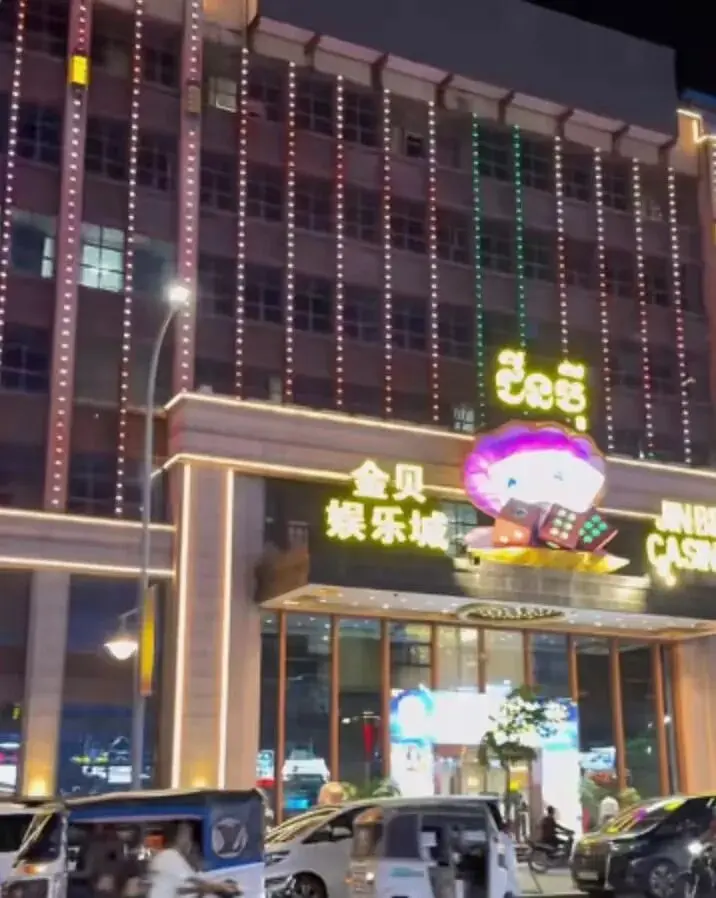 Jinbei Entertainment City under the Prince Group.
Jinbei Entertainment City under the Prince Group.
Informed sources told Jiemian News that in recent years, Chen Zhi's parks have shifted to focus on European and American markets. Data from the U.S. Treasury Department shows that financial losses due to online investment fraud in the U.S. have been steadily rising over the past few years, totaling over $16.6 billion.
The indictment indicates that the main type of fraud executed in the parks operated by the Prince Group is the so-called "pig butchering" scam, a meticulously designed investment scheme. Chen Zhi himself directly managed these bases and kept detailed profit records, clearly labeled as "pig butchering."
In the Jin Hong Park of the Prince Group, a ledger preserved by Chen Zhi detailed the types of fraud responsible for different floors, including "Vietnam order fraud," "Russia order fraud," "European and American investment script chatting," and "Chinese brushing orders." Internal documents also included a guide on how to establish trust with victims, even suggesting using photos of "not-so-pretty" women as avatars to make accounts appear more genuine and trustworthy.
Chen Zhi is charged with conspiracy to commit wire fraud and conspiracy to commit money laundering. Due to the massive amounts involved, if convicted, he could face up to 40 years in prison.
The Establishment of the "Fraud Empire"
In October, after Chen Zhi was indicted, his Prince Group, founded in 2015, also came under scrutiny.
The Prince Group, located in Phnom Penh, Cambodia, is one of the largest corporate groups in Cambodia. It claims to operate over 100 business entities in more than 30 countries, with businesses covering real estate development, financial services, tourism, and consumer services. The group owns well-known subsidiaries such as Prince Real Estate Group, Prince Bank, and Awesome Global Investment Group.
Chen Zhi's business empire has spread throughout Cambodia, with real estate investments alone reaching $2 billion, including a large shopping center in Phnom Penh—Prince Plaza.
Moreover, Chen Zhi's business ambitions have already extended overseas. Since February 2025, the Prince Group has begun a "layout" strategy in China, with showrooms in Japan, Thailand, Vietnam, Russia, and other countries either successfully opened or in preparation. To this day, internet platforms can still retrieve related content about the establishment of its showrooms.
However, the indictment reveals the true nature of this business empire: fraud and money laundering account for the vast majority of the Prince Group's income, while many of its legitimate businesses are not profitable and even incur losses, serving merely to cover up fraud and money laundering.
To enhance the efficiency of fraud, Chen Zhi and his accomplices purchased advanced equipment for their operations. The indictment documents show that in 2018, one accomplice purchased millions of phone numbers and account passwords from illegal online markets, and Chen Zhi himself kept documents describing an automated call center named "Golden Wealth Technology Park," equipped with 1,250 phones and controlling 76,000 social media accounts.
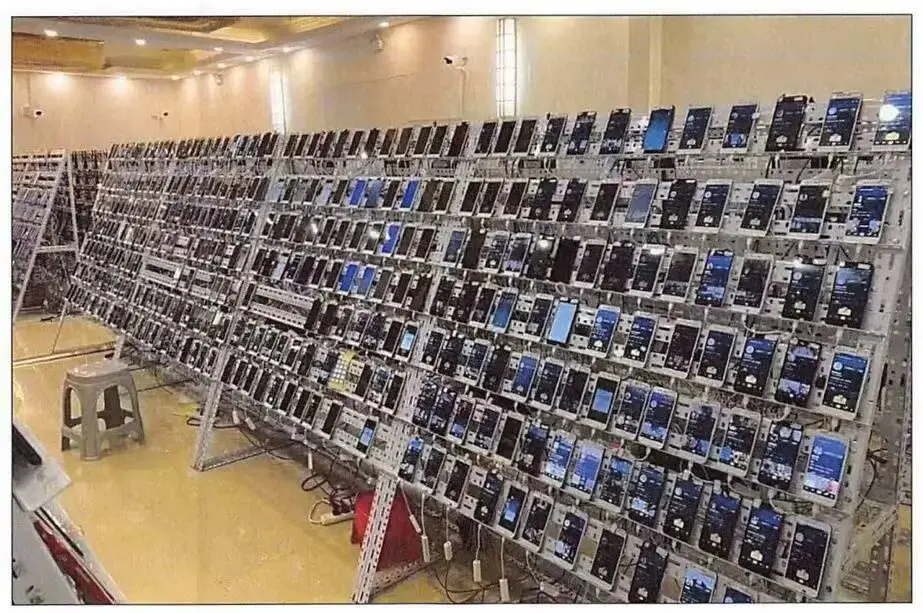 Automated call center used for fraud in the fraud park. Image from the indictment released by the U.S. Department of Justice.
Automated call center used for fraud in the fraud park. Image from the indictment released by the U.S. Department of Justice.
The indictment alleges that one accomplice boasted in the summer of 2022 that in 2018, the Prince Group earned over $30 million a day from "pig butchering" scams and related illegal activities, with an annualized income of about $11 billion. Annually, this amount is nearly one-third of Cambodia's GDP for that year.
The Prince Group frequently employed violent means to maintain the operation of its fraud bases. In one incident, Chen Zhi approved the beating of a person who was "causing trouble" at the base but instructed, "Don't kill him," adding, "We must keep an eye on them and not let them escape." The indictment includes images preserved by Chen Zhi showing violent methods, with visible injuries on multiple individuals. The indictment states that reports of a 25-year-old Chinese citizen being brutally murdered in 2023 are related to the Prince Group.
To protect this criminal enterprise, Chen Zhi and his accomplices systematically bribed public officials in multiple countries. One accomplice was appointed as the risk control supervisor of the Prince Group, specifically monitoring investigations and engaging in corrupt transactions with foreign law enforcement officials.
In May 2023, accomplice-2 communicated with a high-ranking official who stated he could help the Prince Group's accomplices avoid trouble. In return, accomplice-2 offered to "take care" of the official's son.
Chen Zhi's bribery ledger shows that in 2019, an accomplice purchased a yacht worth over $3 million for a senior government official. Chen Zhi himself also bought luxury watches worth millions of dollars for another high-ranking official. In 2020, that official helped Chen Zhi obtain a diplomatic passport, which Chen Zhi used to travel to the U.S. in April 2023.
The indictment alleges that accomplice-2 boasted, "Whenever there is a law enforcement crackdown on the fraud parks, we remain unscathed." Chen Zhi himself also bragged to others about his special connections, including receiving advance information about law enforcement actions in exchange for bribes, allowing him to evade sanctions.
127,271 Bitcoins
The Prince Group's fraud operations extended to the U.S. On the East District of New York, a local organization called The Brooklyn Network assisted the Jinbei Park of the Prince Group in executing investment fraud. Fraudsters contacted victims through messaging apps, claiming to make money by investing in cryptocurrency or foreign exchange markets. They introduced victims to so-called "account managers," who provided bank account information and created investment portfolios on fake trading platforms.
However, these bank accounts were actually opened by the Brooklyn Network in the names of shell companies at financial institutions in New York. The victims' funds were not invested but misappropriated and laundered through these accounts. The "growth" displayed on the trading platform was entirely fictitious. When victims attempted to withdraw large sums, they were told they needed to pay transaction fees, taxes, or legal fees, ultimately severing all contact with the representatives.
Between May 2021 and August 2022, the Brooklyn Network defrauded and laundered over $18 million from more than 250 victims in the Eastern District of New York and across the United States on behalf of the Prince Group.
Chen Zhi and his accomplices laundered vast amounts of criminal proceeds through a complex multi-layered network. This included utilizing money laundering businesses that received fraudulent proceeds stolen from the Prince Group's scams and then funneled these funds back to the Prince Group. A common method was to collect scam proceeds in the form of Bitcoin or stablecoins and then convert them into fiat currency. The money launderers subsequently used these funds to purchase clean Bitcoin or other cryptocurrencies.
The indictment alleges that Chen Zhi directly participated in coordinating these money laundering activities and discussed the illegal money laundering businesses and underground money houses he used with his accomplices. Chen Zhi kept documents explicitly mentioning "BTC laundering" and "BTC money laundering personnel."
The Huione Group, located in Cambodia, was identified as a primary money laundering institution in this operation. The U.S. Treasury Department's Financial Crimes Enforcement Network (FinCEN) stated that Huione laundered at least $4 billion from August 2021 to January 2025, including at least $37 million from North Korea-related cyber theft; at least $36 million from virtual currency investment fraud; and approximately $300 million from other cyber crimes.
According to Huione's official website, it was established in 2014 as an innovative company aimed at bringing leading financial technology services to the world. Several insiders revealed to Jiemian News that Huione has certain connections with the Prince Group. Some claimed that Huione's founder was once an employee of Chen Zhi, "seemingly a former financial manager of the Prince Group."
Huione has long been known as the "world's largest online black market." An investigation by the U.S. company Elliptic, dedicated to preventing crypto-financial crimes, found that Huione had created a "one-stop crime platform" on Telegram (a cross-platform instant messaging software), gathering numerous third-party vendors selling technological tools, personal data, and money laundering services, primarily serving cryptocurrency fraud groups and illegal online operators in Southeast Asia. In May 2015, Telegram comprehensively blocked Huione-related channels and groups.
By 2020, Chen Zhi had accumulated approximately 127,271 Bitcoins in illicitly laundered proceeds, stored in an unmanaged wallet controlled by his personal private keys. At current market value, these Bitcoins are worth about $15 billion. These cryptocurrencies were stored in 25 cryptocurrency addresses belonging to unmanaged wallets, controlled and tracked by Chen himself. Chen Zhi personally recorded the wallet addresses and mnemonic phrases corresponding to each private key.
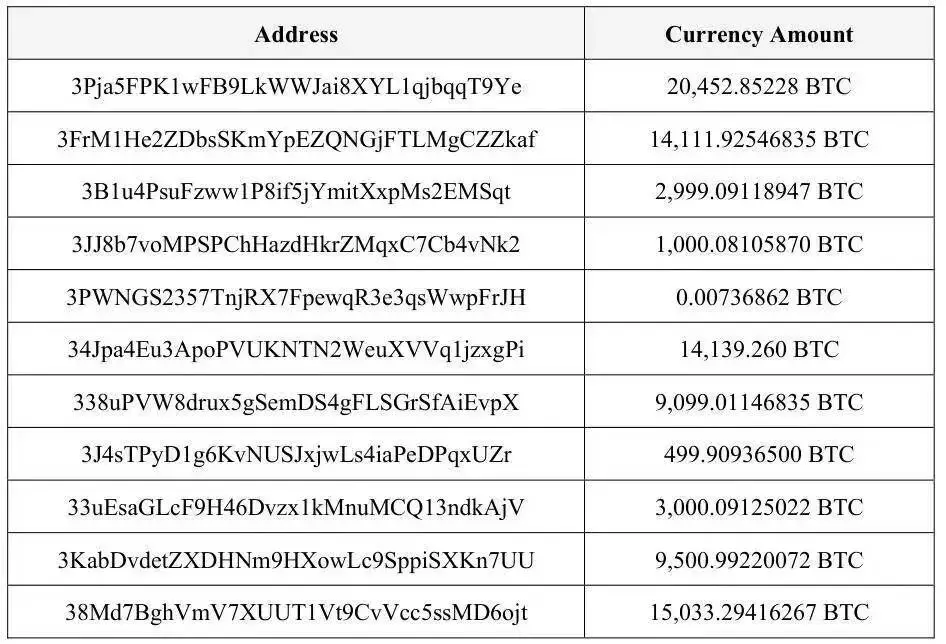 Some of the virtual currency addresses purchased by Chen Zhi after laundering. Image from the indictment released by the U.S. Department of Justice.
Some of the virtual currency addresses purchased by Chen Zhi after laundering. Image from the indictment released by the U.S. Department of Justice.
FBI cryptocurrency analysts determined that the 25 cryptocurrency addresses controlled by Chen Zhi could be divided into 13 clusters, exhibiting similar funding source patterns. These addresses primarily obtained funds through two types of sources: cryptocurrency mining and indirect transfers from centralized exchanges (especially those not cooperating with U.S. law enforcement).
The money laundering process employed complex "decentralized processing" and "centralized transfer" techniques: large amounts of cryptocurrency were repeatedly split into dozens of wallets and then reassembled into fewer wallets, serving no other commercial purpose than to obscure the source of the funds.
For example, one case showed that funds from a Bitcoin mining pool were dispersed to 22 independent addresses and then remerged into a centralized transfer address before being transferred to a wallet controlled by Chen Zhi. Another case showed that funds from an exchange were dispersed to 27 addresses and also transferred out through the same centralized transfer address.
Chen Zhi used the proceeds from fraud to fund large-scale cryptocurrency mining operations, including Warp Data in Laos and its Texas subsidiary, as well as another mining company. This mining company once handled the sixth-largest Bitcoin mining operation globally. Chen Zhi boasted to others that these mining operations "were highly profitable because there were no costs."
Investigations also found that Bitcoin transfers from exchanges were highly correlated in timing and amount with mining revenues, indicating a deliberate attempt to create the illusion that all funds originated from mining.
The indictment shows that a total of 128 companies and 18 individuals have been sanctioned by the U.S. Treasury Department's Office of Foreign Assets Control (OFAC) due to their connections with the Prince Group. Most of these individuals are members of the Prince Group or relatives of Chen Zhi, with their associated companies registered in Cambodia, Singapore, the British Virgin Islands, the Cayman Islands, and the Pacific island nation of Palau, the vast majority of which are "offshore shell companies with no apparent legitimate business or activity." When opening accounts, these companies provided false statements.
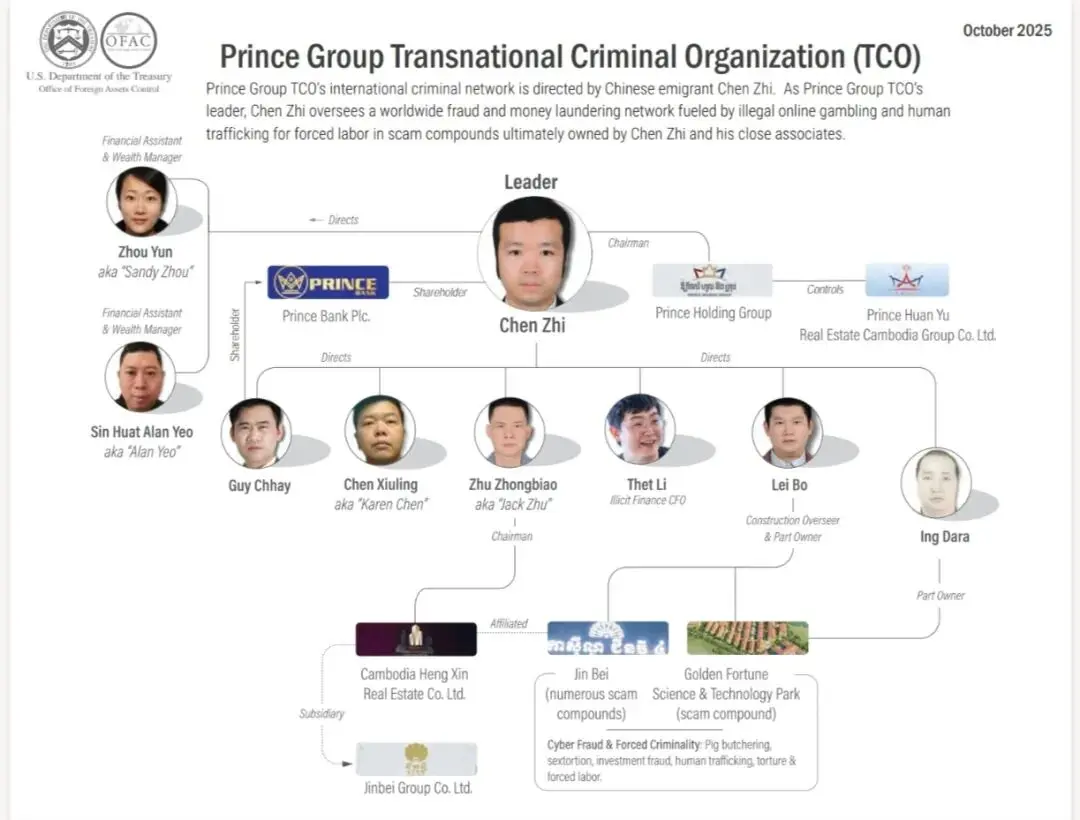 Chen Zhi and the criminal network of the Prince Group. Image from OFAC.
Chen Zhi and the criminal network of the Prince Group. Image from OFAC.
For instance, one company claimed that one of its accounts was for "proprietary trading and investment," with income sourced from "personal wealth," and monthly trading of about $2 million. However, bank records showed that in February 2020, there were actual deposits of about $22.5 million and withdrawals of $21.8 million, underestimating by over 1000%. This potentially violates multiple laws in the U.S.
Ultimately, some of these funds were used for luxury travel, entertainment, and the purchase of expensive items. The purchased items included watches, yachts, private jets, vacation homes, high-end collectibles, and rare items. Among these artworks was a Picasso painting purchased through an auction house in New York City.
Domestic Investigations into Chen Zhi's Gang
Jiemian News found that Chen Zhi has been active in China's capital markets for nearly 15 years, involved in fields including healthcare, entertainment, technology, and commerce. In 2010, Chen Zhi served as the legal representative and executive director of Jiangmen Dacheng Medical Equipment Co., Ltd. In 2011, he became a director of Jiangxi Damai Interactive Technology Co., Ltd.
In the following years, he successively became an executive in several domestic companies in healthcare, commerce, and other sectors. To this day, Chen Zhi remains the manager and executive director of Taizhou Port Biao Trading Co., Ltd. and Zhuhai Yisheng Biotechnology Co., Ltd. In the former company, Chen Zhi also holds 100% of the shares.
Tianyancha shows that Taizhou Port Biao Trading Co., Ltd. (formerly known as Lianyungang Pubiao Trading Co., Ltd.) was established in 2012 and is located in Taizhou, Zhejiang Province, primarily engaged in wholesale. Its business scope includes: food sales; retail of edible agricultural products; sales of gift flowers; furniture sales; cosmetics sales; retail of jewelry; sales of auto parts; sales of Class II medical devices, etc. In 2015, the company was listed in the abnormal operation directory for failing to submit annual reports for 2013 and 2014 as required.
Jiemian News has sorted out that Chen Zhi has invested in 12 domestic companies to date, of which 4 companies are marked as "deregistered," and 1 company has been "revoked." The company with the largest investment share and amount is Chongqing Qusu Infinite Equity Investment Fund Management Co., Ltd. (hereinafter referred to as "Qusu Fund"), which is still in operation.
Tianyancha shows that Qusu Fund was established in 2015 and is a high-tech venture capital fund focused on investments in the internet, mobile internet, mobile gaming, and related industries. The first phase of the fund has a scale of 500 million yuan, providing financial support for internet startups and enterprises in China. Its registered capital is 50 million yuan, with Chen Zhi holding 70% of the shares.
In July 2021, the company was listed in the abnormal operation directory by the Chongqing Liangjiang New Area Market Supervision Administration for failing to publicly disclose its annual report within the deadline. In October 2024, Qusu Fund was again listed in the abnormal operation directory due to its registered address or business location being unreachable.
On December 9, 2022, the China Securities Investment Fund Industry Association (hereinafter referred to as "CSFIA") issued a notice regarding the cancellation of the private fund manager registration of Chongqing Zhengyin Guanghui Equity Investment Fund Management Co., Ltd. and 27 other private fund managers whose registration period had expired and had not submitted special legal opinions (hereinafter referred to as "the Notice").
The Notice indicated that 27 private fund managers, including Qusu Fund, exhibited abnormal operational conditions and failed to submit compliant special legal opinions within three months of receiving written notification. Therefore, the CSFIA canceled the private fund manager registration of these 27 institutions and recorded the aforementioned conditions in the capital market integrity database.
In March 2025, after a random inspection, the Chongqing Securities Regulatory Bureau issued a statement regarding Qusu Fund: the company had its private fund manager qualification canceled by the CSFIA on December 9, 2022, and does not possess the qualifications to operate private funds, nor may it use the terms "fund," "fund management," "private placement," or similar names for private fund business activities.
However, as of now, Qusu Fund has not undergone a name change.
On the morning of October 22, a Jiemian News reporter called the Chongqing Securities Regulatory Bureau regarding this matter. The other party stated that since Qusu Fund's private fund qualification was canceled in December 2022, the bureau had repeatedly urged it to change its name and had also made several related risk reminders to the public.
As for whether there were any previous violations or compliance issues, due to the long time since Qusu Fund's cancellation, the Chongqing Securities Regulatory Bureau could not provide an accurate answer. The staff explained, "His private fund qualification was canceled three years ago, and it is no longer under our jurisdiction." For more related questions, the staff suggested consulting other local departments in Chongqing.
In fact, prior to the joint accusations from the U.S. and the UK, there had already been actions taken against Chen Zhi's gang domestically.
In 2020, the Beijing Public Security Bureau established a special task force on May 27 to investigate the "Cambodian Prince Group's major cross-border online gambling crime group"; in 2023, the Wanzhang Court in Sichuan Province heard a major cross-border online casino case. The involved individual, Yuan Mouhua, was found to have partnered with individuals related to the Prince Group to establish an online gambling company targeting Chinese citizens since 2016, with the amount involved exceeding 5 billion yuan.
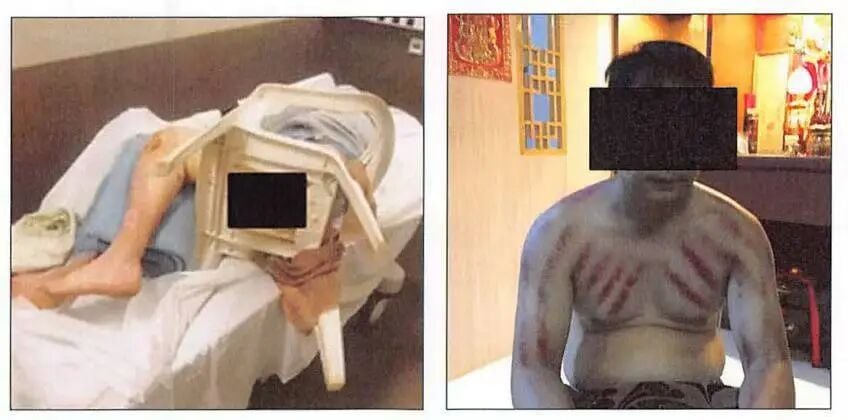 Victims subjected to abuse in the fraud park. Image from the indictment released by the U.S. Department of Justice.
Victims subjected to abuse in the fraud park. Image from the indictment released by the U.S. Department of Justice.
Turbulence in Cambodia
On one hand, labeled as a "cyber fraud giant" by the U.S. and the UK, on the other hand, Chen Zhi has made a name for himself in the Cambodian business community.
Ten years ago, since the establishment of the Prince Group, Chen Zhi seemed to intentionally showcase his "philanthropic" side. In Cambodia, he initiated numerous charitable projects. The Prince Group collectively named these initiatives "Prince Charity," claiming to focus on education and youth development, healthcare, community engagement, and sports. Chen Zhi himself is hailed on their official website as "a respected entrepreneur in Cambodia's business community."
Among the so-called Prince Charity initiatives, there is a scholarship named after him, called the "Chen Zhi Scholarship," touted as a benchmark project. Its partner institutions include the Royal University of Phnom Penh (Information Technology Engineering, Computer Science, International Business Management, Media and Communication); the Institute of Technology of Cambodia (Civil Engineering); and the National University of Management (Digital Economy and Tourism).
It is evident that the funded students are all related to Chen Zhi's business domain. This move raises the question of whether it is an intentional effort to cultivate professional talent for himself.
According to its official website, over the past seven years, the Prince Group has provided full scholarships, stipends, internships, and job opportunities to 400 Cambodian university students. Additionally, the website states, "We have initiated over 280 charitable activities, benefiting more than 1.5 million people, with total donations exceeding $18 million."
In terms of disaster relief and healthcare, the Prince Group has also made several large-scale donations. An article on its website mentions that Chen Zhi actively responded to local government calls, donating funds and materials for epidemic prevention and disaster relief efforts, stating, "In the past six years, the Prince Group Holdings has invested over $2 billion in Cambodia."
In the past two years, Chen Zhi and his Prince Group have received multiple international business awards: the Best Socio-Economic Development Contribution Award in Cambodia (International Finance Awards), the Outstanding Individual of the Year (2024 Global Economic Awards), and the Corporate Social Responsibility Innovation Achievement Award (2025 Asia-Pacific Stevie Awards).
In Cambodia, Chen Zhi is not only a well-known entrepreneur and philanthropist but has also been officially awarded a lordship by the government.
Recently, the spokesperson for the Cambodian Ministry of Interior, Dousuka, stated that the Cambodian government hopes that the United States and the United Kingdom can provide sufficient evidence when taking legal action against the Prince Group and its founder, Chen Zhi.
He claimed that the process for Chen Zhi to obtain Cambodian citizenship complies with legal regulations. Dousuka believes that the operations of the Prince Group in Cambodia fully meet local legal requirements and enjoy the same treatment as other investment enterprises in Cambodia.
He also stated that if there is solid evidence, Cambodia is willing to cooperate with investigations. At the same time, Dousuka emphasized that they will not shelter any wrongdoers, "but the Cambodian government itself has not accused the Prince Group or Chen Zhi of any wrongdoing."
Regardless, the unfolding of the Chen Zhi and Prince Group incident has created a tsunami-like wave in Cambodia. A local Chinese media worker mentioned that friends around him have recently been discussing this matter, and Cambodian citizens are leaving comments on social media, saying they have seen Chen Zhi's true colors, "We need to eradicate this tumor," and calling for his arrest.
Chen Zhi is currently missing, and the information on the Prince Group's official website has not been updated since April 2025, with the latest news titled "The Prince Group Wins the Silver Award for the 'Chen Zhi Scholarship,' Supporting the Popularization of Education in Cambodia."
The Prince Group's official website does not disclose any external contact numbers, only providing an email address. Jiemian News sent an interview request to the Prince Group via this email, but no response was received by the time of publication. An individual claiming to have previously worked in the Prince Group's branding department told Jiemian News that Chen Zhi had been involved in various project types within the group, including both legitimate businesses and gray or even illegal operations, but that grassroots employees have limited knowledge. After the case was exposed, some former employees worried about being implicated, feeling "anxious."
Following this incident, many Cambodian citizens, fearing that the virtual currency held at Huione would disappear, lined up at Huione's offline service centers to request cash withdrawals. Some people, unable to wait, had to use other channels to quickly convert their cash at a 10% discount.
On the afternoon of October 17, a Chinese woman waited in line for three hours at the Phnom Penh service center and finally managed to withdraw her money. She recorded a video of the crowded scene and advised those who would be withdrawing next to bring food and a stool, saying, "There are too many people."
免责声明:本文章仅代表作者个人观点,不代表本平台的立场和观点。本文章仅供信息分享,不构成对任何人的任何投资建议。用户与作者之间的任何争议,与本平台无关。如网页中刊载的文章或图片涉及侵权,请提供相关的权利证明和身份证明发送邮件到support@aicoin.com,本平台相关工作人员将会进行核查。




